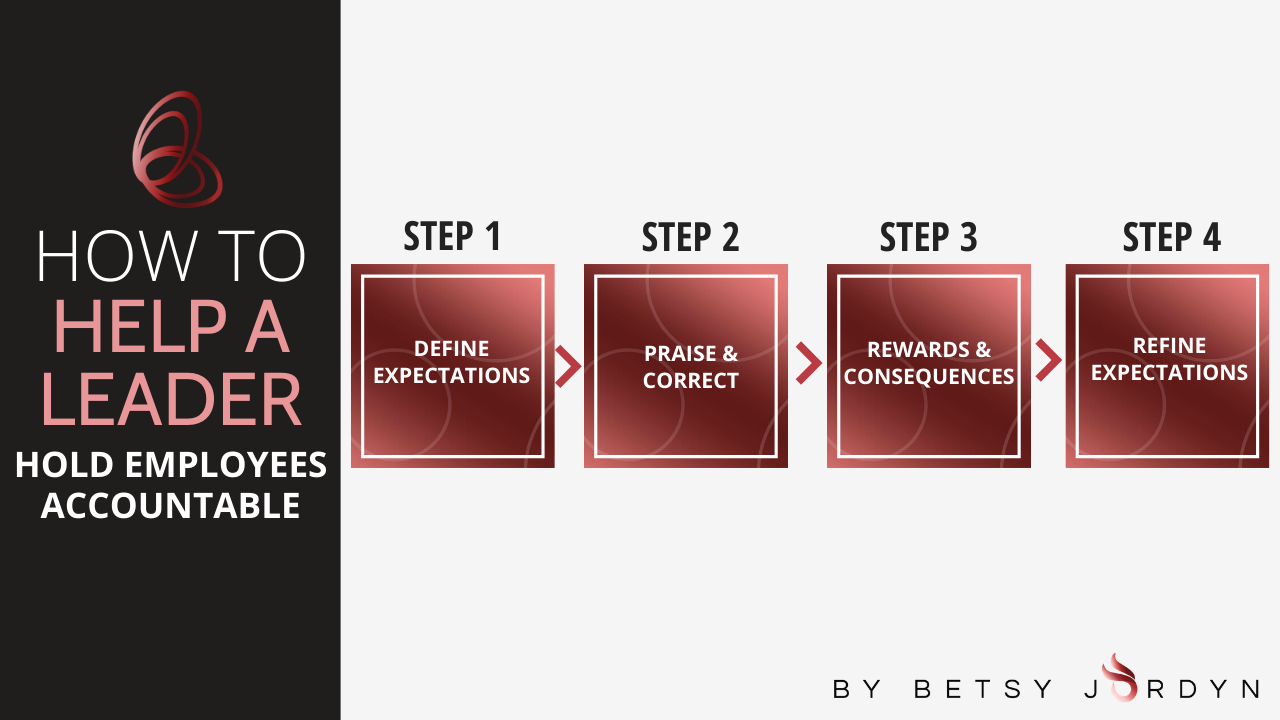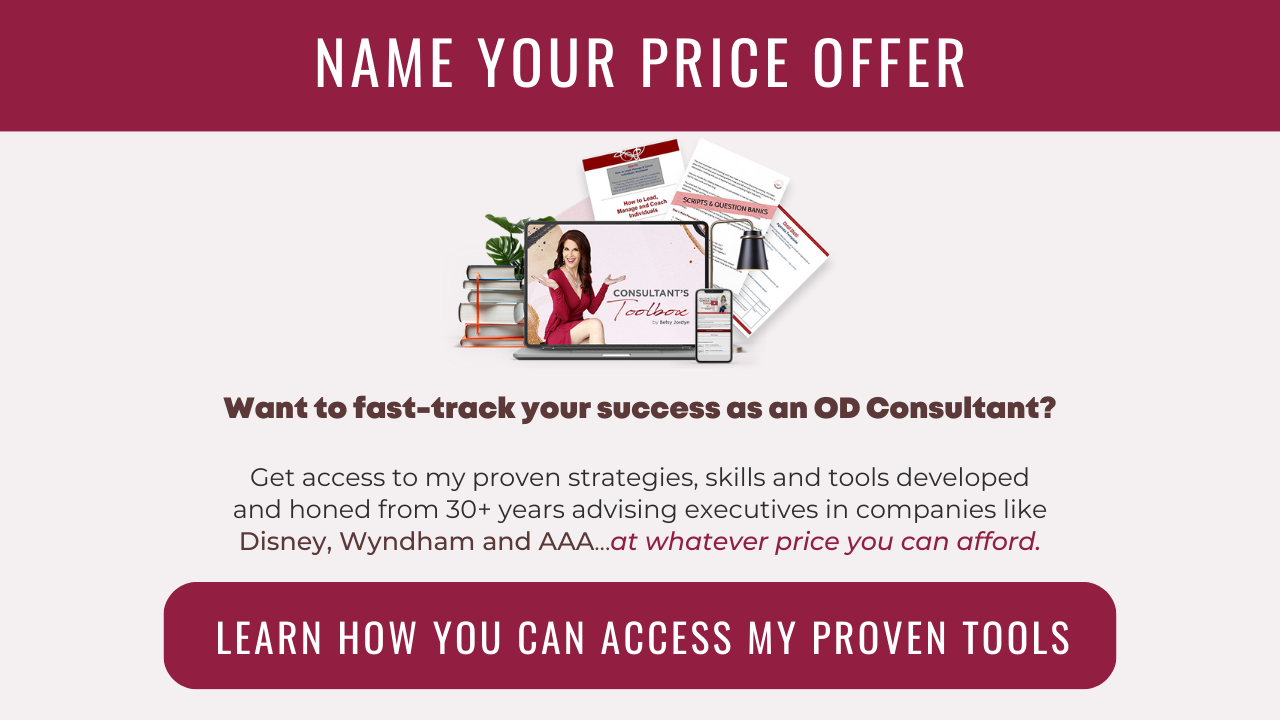Here's a Method for Helping a Leader Hold Employees Accountable
Jun 17, 2020
Got a conflict-avoidant client and not sure how to help them? I want to give you some message points to help them understand why holding their employees accountable is in everyone's best interest and some ideas on how to equip them to more effective.
The Message Points - Why Accountability is Good for All
Holding people accountable for results is about providing the conditions for an employee to freely choose whether to meet or exceed expectations and experience the resulting consequences (positive or negative) of their choices. It is not about communicating blame, frustration and/or disappointment in a monthly meeting or performance review.
A leader who holds his or her employees accountable is treating these individuals as self-directed, empowered responsible adults.
Other benefits of increasing the accountability in others include:
- Visibly demonstrating of the law of the universe where there is cause…there is effect.
- Communicating with actions that your employee is not a victim.
- Teaching ownership and how to take responsibility for how the aptitude they may or may not have and the attitude they demonstrate.
- Alleviating others on a team who have to deal with the burden of an employee who is not performing.
Effective Accountability Begins with Expectations
Walk your clients through these four phases to holding people accountable:
Phase 1 (Define Expectations): They cannot hold someone accountable for an expectation you have not communicated.
Phase 2 (Praise and Correct): They need to verbally let someone know if they are on track with regards to your expectations. Performance reviews or discussions of performance problems should never be a surprise.
Phase 3 (Rewards and Consequences): The right behavior needs to be reinforced and the logical consequences for poor performance should not be interfered with.
Phase 4 (Review and Refine Expectations): Implicit changes to performance expectations need to be communicated explicitly.
7 Steps to Leading Accountable Employees
If they are not getting the performance they need from their direct report, have them undertake the following seven steps:
- Review the performance expectations. Assess if they were clear, relevant, and measurable. If not, then guide them through the following:
- Go back to the drawing board and define what their objectives are and how those objectives will be measured.
- Have them write their performance expectations to get what they want.
- Focus on specific results
- Crisp concise statements
- Obvious prioritization
- Written in objective terms (action verb, results statement, time targeted, standard of performance)
- Create measures that relate to output (quality, quantity, timeliness and cost)
- Review what your client praises and how they praise. Does their praise relate specifically to their performance expectations? Do they communicate positive feedback in a way that is meaning to their employee (e.g., some prefer written and private, others personal verbal, etc.)
- Review your client's reward system. Are their rewards tangible, significant and reinforce desired behavior. For example, if their employee exceeded sales goals, do they reward him or her with increased commission and prime territory or just a plaque?
- Review how they correct poor performance. Does their feedback directly tie into the stated and clear performance expectations? Are they clear that if the behavior continues what the consequences will be? If not, then show them how to do the following:
- State the Situation: Provide facts and observations about performance
- Describe the Impact: Explain how the behavior affects you and others
- Preferred Behavior: Be clear about what behavior you would like instead
- Review the consequences that your client enforces for an employee who continually chooses to not meet expectations. Are the consequences logical? Do they provide enough “pain” for not meeting expectations? For example, if their employee consistently under delivers on sales quotas, is he or she at risk for missing out on commission, territory and eventually job loss?
- Analyze their specific performer issues. Is the issue they are dealing with more related to aptitude or attitude? If the issue is more related to aptitude, they may want to try providing extra training or mentoring before enacting consequences. If the issue is more related to attitude, in many cases, more significant consequences may be required.
- Review your client's own comfort level with accountability. It is essential that they assess their own willingness to deal with difficult issues and confrontation. Their fears of not being liked, need for approval, fear of anger/conflict or over identification with other people’s problems may inhibit their ability to provide the conditions for their employees to choose their performance levels.
The Bottom Line
Your job as a consultant is to equip and empower a leader to faithfully execute their leadership responsibility for accountability and not do it for them.
To be a great leader, your client has to learn how to step out the way and let their employees make their own choices and live with the repercussions. Letting someone experience the full weight of what they decide to do with their performance may hurt them, but doesn’t harm them. However, interfering with the natural consequences for nonperformance will harm them in the long-run. Letting individuals see the truth and telling them the truth with gentleness and grace is a gift a leader can provide his or her employees.
Take Action
The OD Consultant’s Toolbox is all about landing and delivering strategic consulting engagements that will make a difference for both your career and the organizations you want to help.
Ready to take your place as a sought-after, credible organizational consultant?
Click here to learn how to get my proven OD best practices, frameworks, and tools...at whatever price you can afford.
Let's Stay Connected!
Actionable inspiration, expert interviews and behind-the-scenes consulting and coaching secrets and best practices and SO MUCH MORE, delivered to your inbox for a weekly dose of entrepreneurial motivation!
We hate SPAM. We will never sell your information, for any reason.


